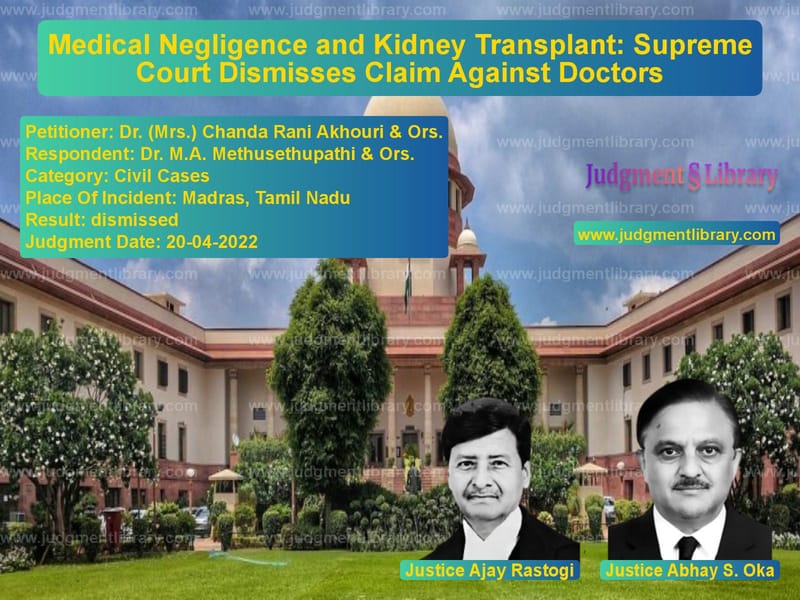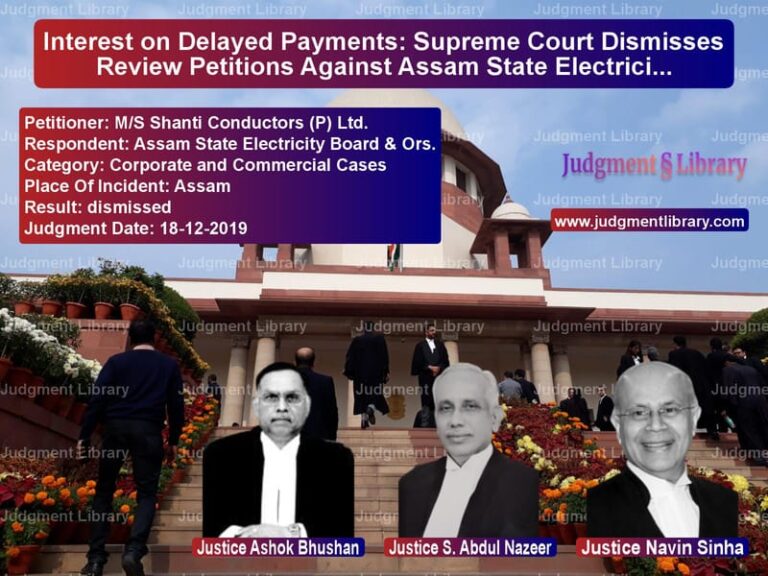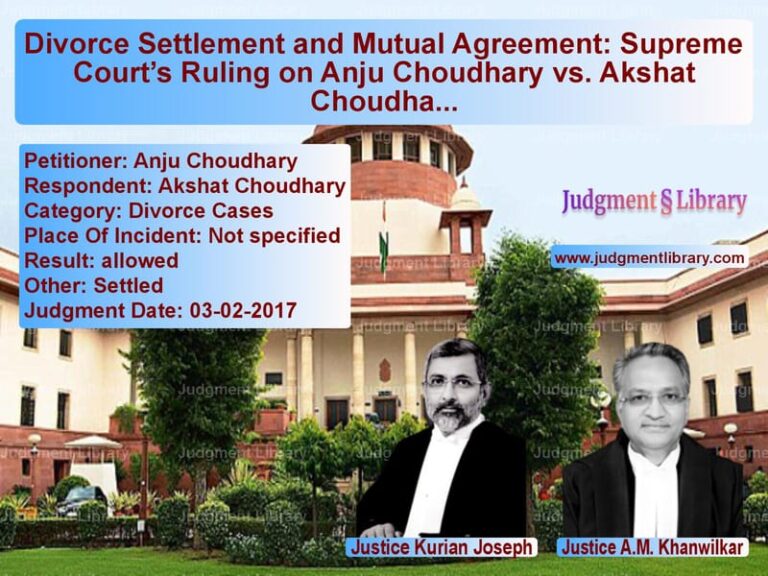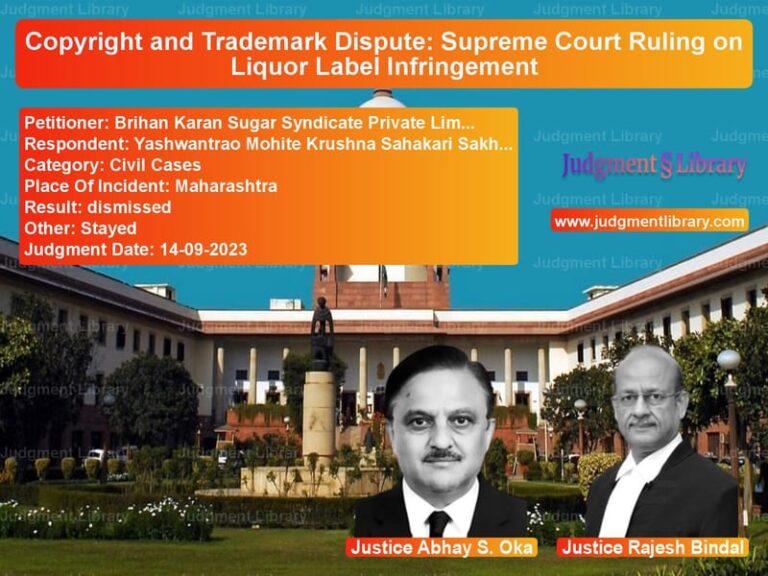Medical Negligence and Kidney Transplant: Supreme Court Dismisses Claim Against Doctors
The case of Dr. (Mrs.) Chanda Rani Akhouri & Ors. vs. Dr. M.A. Methusethupathi & Ors. revolves around a medical negligence claim following the death of a patient after a kidney transplant. The Supreme Court analyzed whether the doctors and hospital staff were responsible for post-operative negligence that allegedly led to the patient’s demise. The Court ultimately ruled in favor of the doctors, dismissing the claim and reaffirming the legal standards for medical negligence.
Background of the Case
The case was initiated by the wife and children of the deceased patient, Naveen Kant, who underwent a kidney transplant at a hospital in Madras in 1995. The family alleged that the medical team, led by Dr. M.A. Methusethupathi, failed to provide adequate post-operative care, resulting in the patient’s death on February 3, 1996.
Medical History of the Patient
- In 1990, Naveen Kant was diagnosed with hypertension and was undergoing treatment.
- In 1995, he was advised to undergo a kidney transplant due to worsening renal failure.
- On November 12, 1995, he underwent a kidney transplant at Aswini Soundra Nursing Home in Madras.
- He was discharged on November 24, 1995 after a successful surgery.
- He was required to attend follow-up treatment as an outpatient.
Allegations by the Petitioner
The petitioners alleged that:
- While in the ICU, the patient developed pain in his left forearm, where intravenous drugs were injected.
- The doctors did not take the pain seriously.
- On November 30, 1995, the doctors diagnosed cellulitis in his left forearm.
- On December 16, 1995, he developed severe headache, loss of vision, and vomiting.
- Despite multiple complaints, doctors failed to treat the infection properly.
- His condition deteriorated into septicemia, leading to multi-organ failure and eventual death on February 3, 1996.
Defense by the Doctors and Hospital
The respondents, including the treating doctors and hospital, argued that:
- The transplant was performed successfully by an expert team.
- The patient’s fever and pain were treated with appropriate antibiotics.
- Infections after transplants are common and cannot always be prevented.
- The patient was regularly monitored after surgery.
- The claim was based on assumptions rather than medical evidence.
Findings of the National Consumer Disputes Redressal Commission
The National Consumer Disputes Redressal Commission (NCDRC) dismissed the claim, concluding that:
- There was no evidence of post-operative negligence.
- The doctors followed standard medical protocols.
- The patient’s complications were unfortunate but not due to medical malpractice.
Supreme Court’s Analysis
The Supreme Court, comprising Justices Ajay Rastogi and Abhay S. Oka, upheld the NCDRC ruling. The Court made the following key observations:
1. Medical Negligence Requires Proof of Breach of Duty
The Court reiterated that medical negligence occurs when a doctor fails to exercise a reasonable degree of care. It emphasized:
“Negligence is the breach of a duty caused by omission to do something which a reasonable man guided by considerations regulating human affairs would do, or doing something which a prudent and reasonable man would not do.”
Read also: https://judgmentlibrary.com/supreme-court-upholds-landowners-rights-in-delhi-compensation-dispute/
2. No Direct Evidence of Negligence
The Court noted that the petitioners failed to provide evidence showing a direct link between the doctors’ actions and the patient’s death. It stated:
“No professional can assure that a patient will recover fully. Doctors must take reasonable care, but an adverse outcome does not necessarily indicate negligence.”
3. Expert Testimonies Favor the Doctors
The Court found that expert testimonies submitted by the doctors supported their treatment approach. The medical experts confirmed that infections and complications are inherent risks in transplants, even with the best care.
4. No Basis for Compensation
The Court ruled that since there was no medical negligence, the demand for Rs. 95,16,174.33 in compensation was unjustified.
Final Judgment
- The Supreme Court dismissed the appeal.
- It upheld the NCDRC’s ruling in favor of the doctors and hospital.
- It affirmed that medical negligence must be proved with concrete evidence.
- The Court expressed sympathy for the family but stated that legal recourse cannot be based on assumptions.
Impact of the Judgment
This ruling is significant for the medical community and patients:
- Reaffirms the Bolam test for medical negligence.
- Establishes that medical professionals should not be held liable for unfortunate outcomes unless there is clear negligence.
- Protects doctors from frivolous litigation while ensuring patient rights are upheld.
Conclusion
The Supreme Court’s decision in Dr. (Mrs.) Chanda Rani Akhouri vs. Dr. M.A. Methusethupathi reinforces the principles of medical negligence law in India. The ruling highlights the need for substantial evidence to prove negligence and provides clarity on the responsibilities of doctors in post-operative care.
Petitioner Name: Dr. (Mrs.) Chanda Rani Akhouri & Ors..Respondent Name: Dr. M.A. Methusethupathi & Ors..Judgment By: Justice Ajay Rastogi, Justice Abhay S. Oka.Place Of Incident: Madras, Tamil Nadu.Judgment Date: 20-04-2022.
Don’t miss out on the full details! Download the complete judgment in PDF format below and gain valuable insights instantly!
Download Judgment: dr.-(mrs.)-chanda-ra-vs-dr.-m.a.-methusethup-supreme-court-of-india-judgment-dated-20-04-2022.pdf
Directly Download Judgment: Directly download this Judgment
See all petitions in Medical Malpractice
See all petitions in Consumer Rights
See all petitions in Judgment by Ajay Rastogi
See all petitions in Judgment by Abhay S. Oka
See all petitions in dismissed
See all petitions in supreme court of India judgments April 2022
See all petitions in 2022 judgments
See all posts in Civil Cases Category
See all allowed petitions in Civil Cases Category
See all Dismissed petitions in Civil Cases Category
See all partially allowed petitions in Civil Cases Category







